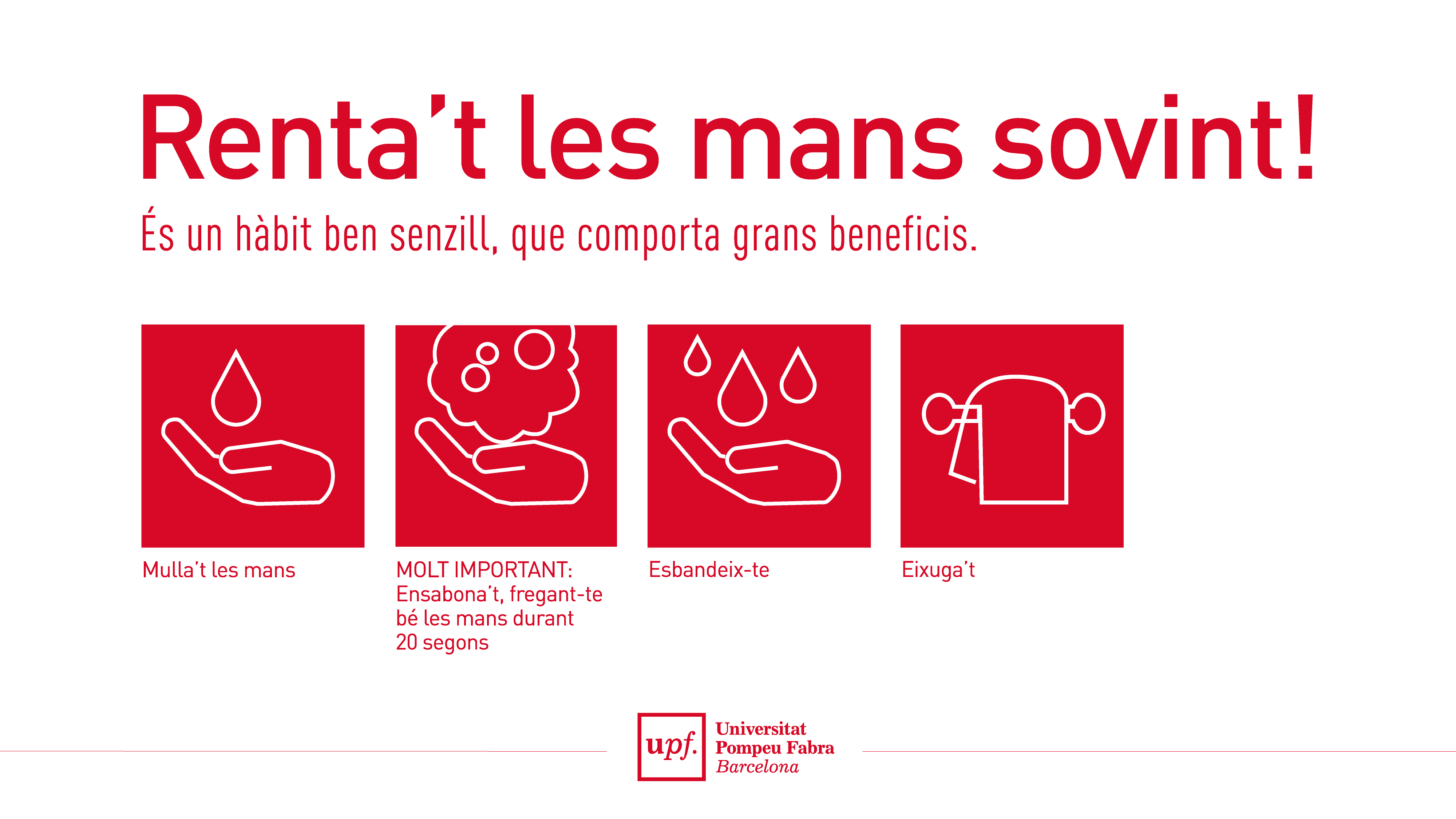Measures taken at UPF facilities
 Since early March, the University has reinforced the cleaning and ventilation of its facilities.
Since early March, the University has reinforced the cleaning and ventilation of its facilities.
It has also launched an information campaign to foster the habit of hand-washing, always wearing a mask, and keeping a safe distance. Information posters have been put up and information is also disseminated via Canal UPF (screens on the campuses).
In addition, exceptional covid-19 signage has been designed and installed in the University buildings concerning mobility, the use of lifts and toilets, and receiving the public, among others.
Cleaning
The current cleaning service has been reinforced and restructured to enable a significant increase in the frequency with which offices, classrooms, meeting rooms and common areas or passageways etc. are cleaned in order to be able to have all classrooms clean at the start of the day.
The new operational plan involves:
- Increasing the frequency and disinfection of areas frequented by large numbers of people, such as classrooms, the library and toilets, ensuring that they are cleaned daily, at least
- Increasing the cleaning of furniture and surfaces that are frequently touched
- Providing a specific procedure for disinfecting the work posts and equipment of persons who inform that they are covid-19 cases or close contacts
- Cleaning and disinfecting spaces and facilities that are shared by more than one employee before a change of shift, with a documentary record of the cleaning operation upon change of shift.
Given their importance, the following actions are highlighted:
- Classrooms
- Will be cleaned once a day, at the end of teaching activities, according to specific procedures and ensuring the replacement of hydroalcoholic gel
- Individual offices and those occupied by a maximum of two people
- Cleaning twice a week
- Offices shared by more people
- Daily cleaning
- Dining areas
- Cleaning twice a day
- Library
- Permanent cleaning staff during opening hours of reading rooms
- Toilets
- Cleaning at least three times a day with a documentary record of the proceedings, always using disinfectants and ensuring the provision of soap
- User support desks
- Cleaning twice a day, always before a change of shift, with a documentary record of the proceedings.
Disinfection of spaces occupied by people who inform that they are covid-19 cases or close contacts
Once the Office for Occupational Hazards Prevention has been informed of a positive case of infection or a case of close contact with a positive case, the space will be disinfected according to a specific procedure, including the disinfection of walls, furniture, fittings... leaving premises closed and sealed off for at least 24 hours, then proceeding to ventilate and renew the air 100%.
Ventilation
Many parts of the University, classrooms, meeting rooms, Library spaces... do not have windows to the outside. However, all parts of Ciutadella, Poblenou and Mar campuses are equipped with air conditioning and ventilation systems that allow the renewal of the air inside.
For this reason, apart from the recommendations to naturally ventilate spaces, the University has paid special attention to its mechanical ventilation systems.
Since the declaration of the state of alarm, the University technical services have adapted the set-up of the air conditioning installations so that, on the premises that so permit, no indoor air is recirculated, that is to say, all the air inside is taken 100% from the outside. In areas where 100% renewal is not possible, as much air as possible will be input from the outside.
It should be borne in mind that given the priority situation of the pandemic, this set-up, from an energy point of view, makes us rather inefficient as we expel cooled air to the outside and input air at outside temperature to the inside. This will obviously increase the cost of air conditioning.
We have increased the frequency with which filters are changed and the air-conditioning units are disinfected, maintaining the air quality analysis programme.
The toilet air extraction systems, as they are particularly sensitive areas, are operative 24 hours a day.
Because these areas are fitted with motion sensors, they have been programmed to ventilate automatically when occupied and to continue airing for four hours once vacated. Also, when the cleaning staff are working in an area, it is automatically ventilated for four hours, regardless of whether there is anybody actually there.
It is important to mention that, in offices it is the user who must activate the air conditioning to enable ventilation and for this reason the office cleaning procedures will include the requirement to activate the ventilation of areas cleaned, and the occupants of offices will be reminded of this recommendation.
The goal of this programming is to ensure the automatic ventilation of areas without the need for natural ventilation.
